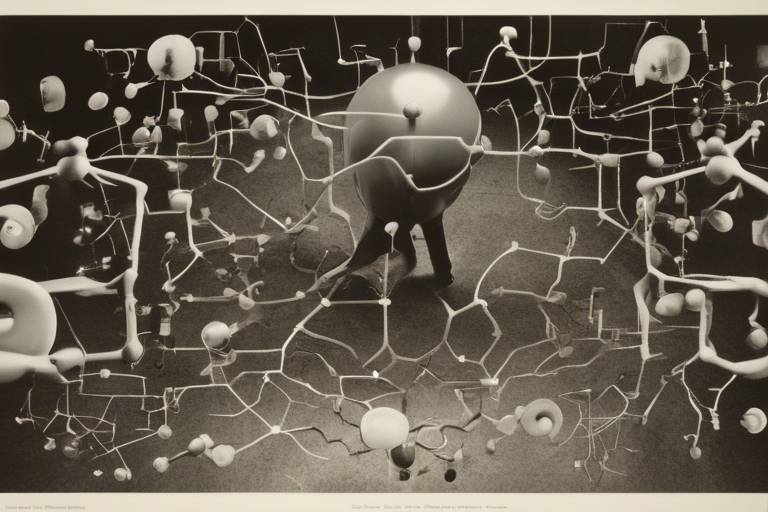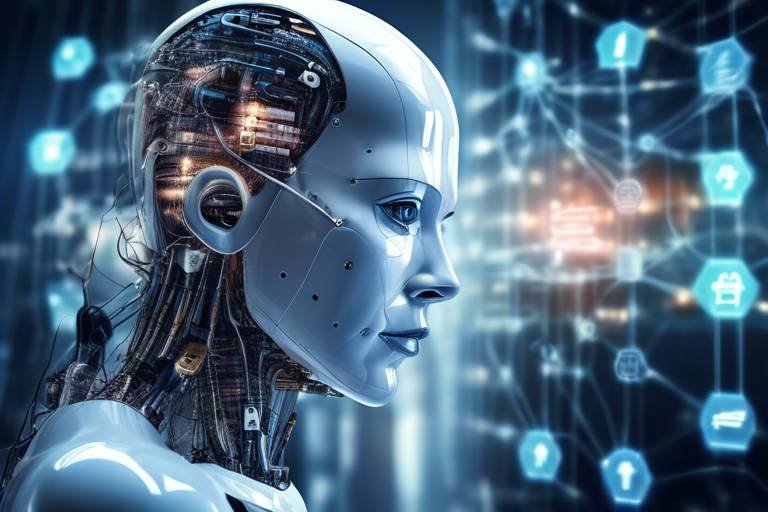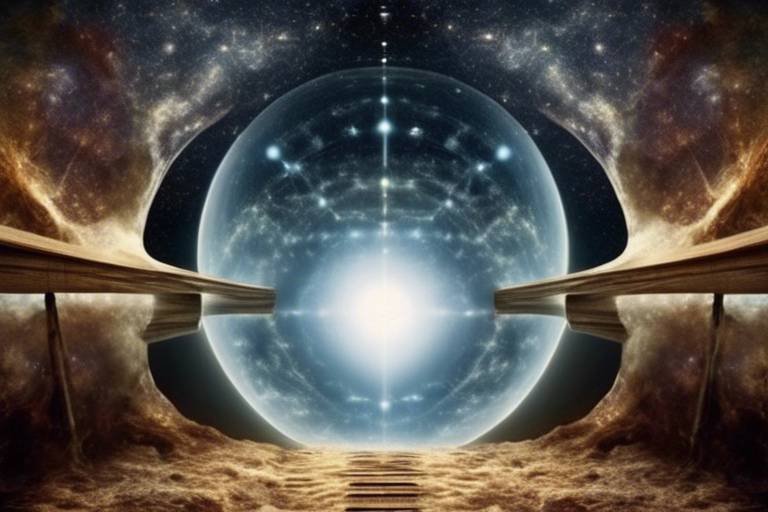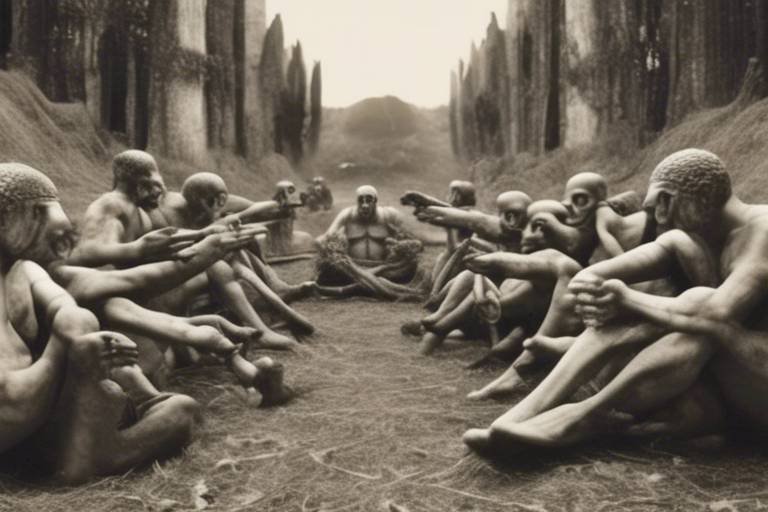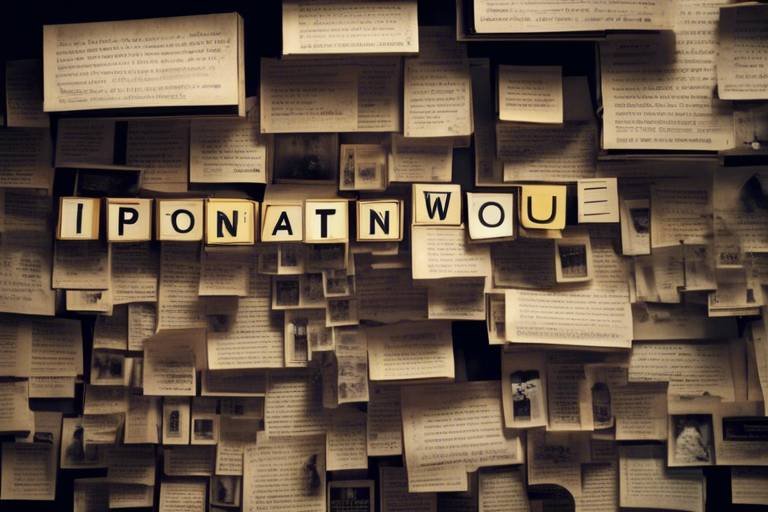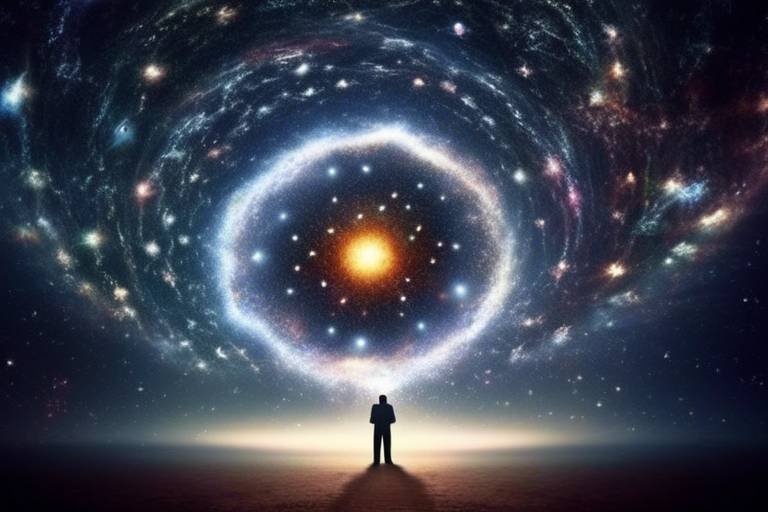What Does Metaphysics Say About Time Travel?
Time travel has long captured the imagination of scientists, writers, and philosophers alike. But what does metaphysics, the branch of philosophy concerned with the fundamental nature of reality, say about this intriguing concept? In this article, we will explore the philosophical implications of time travel, diving into theories, paradoxes, and the very nature of time itself. You might be wondering: can we really travel through time? Or is it just a fanciful notion reserved for science fiction? Let’s journey through the metaphysical landscape of time travel and discover how it reshapes our understanding of existence.
To grasp the metaphysical implications of time travel, we first need to understand the nature of time itself. Metaphysics presents time as a complex and multifaceted concept. Is it linear, moving from past to present to future? Or is it cyclical, endlessly repeating itself like the seasons? Some philosophers argue that time is merely an illusion, a construct of human perception, while others contend that it is a tangible entity that governs the universe. Imagine time as a river: it flows steadily, but there are eddies and whirlpools that suggest a deeper complexity beneath the surface. This duality raises profound questions: if time is an illusion, what does that mean for our experiences and memories? And if it is a tangible entity, how does that shape our understanding of reality?
Diving deeper into metaphysics, we encounter various philosophical theories surrounding time travel. Two of the most prominent theories are eternalism and presentism. Eternalism posits that all points in time—past, present, and future—exist simultaneously, much like a book where every page is equally real. In contrast, presentism argues that only the present moment is real, with the past and future being mere constructs of our minds. These theories not only influence our understanding of time travel but also challenge our perceptions of reality itself. If we can travel to the past under eternalism, what does that mean for our actions? Are we merely observers, or do we have the power to change the course of events?
As we ponder the implications of time travel, we inevitably encounter famous temporal paradoxes. One of the most notorious is the grandfather paradox, which poses a fascinating dilemma: if you were to travel back in time and prevent your grandfather from meeting your grandmother, would you cease to exist? This paradox highlights the complex interplay between cause and effect and raises critical questions about the nature of reality. Metaphysicians have long debated how to resolve these logical conundrums, with some suggesting that such actions create branching timelines, where every choice spawns a new reality.
Various philosophical solutions have been proposed to address these paradoxes. One popular idea is the many-worlds interpretation, which suggests that every time a choice is made, the universe splits into multiple realities. In this view, if you were to change the past, you wouldn’t erase your original timeline; instead, you would create a new one. This theory offers a fascinating perspective on the nature of existence and the potential for infinite realities. However, it also raises questions about the implications of our choices and whether we can ever truly alter our fate.
Time travel theories also challenge our understanding of free will. If our actions can be altered through time travel, does that mean our choices are predetermined? Are we merely players in a cosmic play, with our scripts written long before we take the stage? These questions provoke deep existential reflections, forcing us to confront the nature of our decisions and the extent of our autonomy. As we navigate this intricate web of time and choice, we must ask ourselves: are we the authors of our destinies, or are we bound by the threads of time?
Time travel has also left an indelible mark on literature and popular culture. From H.G. Wells' classic "The Time Machine" to modern films like "Interstellar," these narratives explore the complexities of time and existence. They often reflect societal views on our relationship with time, memory, and the future. Through these stories, we grapple with the implications of time travel, pondering our place in the universe and the consequences of our actions. Each tale serves as a mirror, reflecting our hopes, fears, and the eternal quest for understanding.
Beyond the theories and paradoxes, time travel presents broader metaphysical implications that challenge our understanding of causality and existence. If we can traverse time, what does that say about the nature of reality? Can we alter the past, and if so, how does that impact our present and future? These questions provoke thought about the very fabric of existence, urging us to reconsider our beliefs about time and our place within it.
Time travel also raises intriguing questions about identity. If we can visit our past selves, how do our experiences shape our understanding of who we are? Are we the same person at different points in time, or do our experiences create distinct identities? This exploration of self challenges us to consider how our memories and choices define our existence. It’s as if we are a book, with each chapter representing a different phase of our lives, yet all contributing to the narrative of who we are.
Lastly, we must confront the ethical dilemmas posed by time travel. If we had the power to change the past, what responsibilities would come with it? Would altering significant events create unintended consequences? The moral implications of time travel compel us to reflect on our actions and their impact on the greater tapestry of existence. Each decision we make, whether in the present or the past, ripples through time, shaping the future in ways we may never fully comprehend.
- Can time travel really happen? While time travel remains a theoretical concept, scientific theories such as relativity suggest it may be possible under certain conditions.
- What are the main theories of time? The main theories include eternalism, which posits all time exists simultaneously, and presentism, which holds that only the present is real.
- How do paradoxes affect our understanding of time travel? Paradoxes like the grandfather paradox challenge our notions of causality and prompt philosophical debates about the nature of time and choice.
- What ethical dilemmas does time travel present? Time travel raises questions about responsibility, the consequences of altering past events, and the moral implications of our choices.

The Nature of Time
When we delve into the concept of time, we often find ourselves entangled in a web of philosophical inquiries that challenge our everyday understanding. Is time merely a linear progression of moments, or could it be something more intricate, perhaps even cyclical? Metaphysics offers various interpretations of time, each with profound implications on how we perceive our existence and reality. For instance, the linear view posits that time flows in a straight line from the past, through the present, and into the future. This perspective paints a picture of time as a river, where each moment is a drop that flows continuously onward.
On the other hand, the cyclical view suggests that time is more like a wheel, where events and experiences repeat in an endless loop. This idea can be seen in numerous cultures and philosophies, where time is not just a one-way street but rather a cycle of birth, death, and rebirth. Imagine life as a spiral staircase—though we may seem to revisit the same points, we are forever ascending to new heights and perspectives.
Furthermore, the notion of time as an illusion raises fascinating questions. If we consider time to be a construct of human perception, then what does that mean for our reality? Are we simply prisoners of a mental framework, navigating through a dimension that may not exist in the way we believe? This perspective aligns with certain philosophical doctrines that argue time is not a tangible entity but rather a projection of our consciousness. In this view, the past, present, and future coexist simultaneously, challenging our conventional understanding of sequence and causality.
To illustrate these concepts further, let's consider the following table that summarizes the different perspectives on time:
| Perspective | Description |
|---|---|
| Linearity | Time flows in a straight line from past to future. |
| Cyclicality | Time is a repeating cycle of events. |
| Illusion | Time is a construct of human perception, not a tangible entity. |
These varying interpretations of time not only shape our philosophical discussions but also influence how we live our lives. For instance, if we view time as linear, we might feel pressured to make the most of every moment, fearing that time is fleeting. Conversely, a cyclical perspective may encourage us to embrace the present, understanding that experiences are part of a larger, repeating pattern.
Ultimately, the nature of time remains one of the most profound mysteries in metaphysics. It invites us to ponder our existence, our choices, and our understanding of reality itself. As we explore the philosophical implications of time travel in the following sections, it’s essential to keep these foundational concepts in mind, as they will inform our understanding of temporal paradoxes and the very fabric of our universe.

Philosophical Theories of Time Travel
When we dive into the realm of time travel, we’re not just stepping into a sci-fi movie; we’re engaging with some profound philosophical theories that challenge our understanding of reality. Time travel isn’t merely a plot device; it raises questions about the very fabric of existence, the nature of time, and how we perceive our own lives. Two primary theories dominate the discussion: eternalism and presentism.
Eternalism posits that all points in time—past, present, and future—are equally real. Imagine time as a vast landscape where every moment exists simultaneously, much like a book where all pages are bound together. In this view, time travel becomes a feasible concept, as one could theoretically navigate through these pages, visiting any moment at will. This perspective aligns with the idea that the universe is a four-dimensional block where time is just another dimension, similar to how we perceive space.
On the other hand, presentism argues that only the present moment is real, while the past and future are mere abstractions. This theory suggests that time is like a flowing river, where only the surface—the present—is tangible. If we were to time travel in this framework, we might face insurmountable challenges. For instance, how could one interact with a past that, according to presentism, doesn’t exist anymore? This leads to an intriguing paradox: if the past is gone, is it possible to change it, or does time travel merely create an illusion of change?
Both theories come with their implications for our understanding of reality. Eternalism opens the door to the possibility of multiple timelines and the idea that every decision creates a branching path, leading to different outcomes. This is where the concept of multiverse theory comes into play, suggesting that every possible outcome of every decision exists in its own universe. Conversely, presentism raises questions about free will and determinism. If only the present is real, can we truly change our future, or are we merely following a predetermined path?
In exploring these theories, we also encounter fascinating temporal paradoxes that challenge our intuitions. The grandfather paradox is perhaps the most famous, illustrating a scenario where a time traveler could potentially prevent their own existence by altering past events. Such dilemmas force philosophers to grapple with the implications of time travel on causality and existence itself. How can one reconcile the act of traveling back in time with the linear narrative of cause and effect that governs our understanding of reality?
Ultimately, the philosophical theories of time travel invite us to rethink our assumptions about time, existence, and the choices we make. They serve as a reminder that the nature of reality is far more complex than it appears. As we ponder these concepts, we find ourselves at the intersection of science, philosophy, and the human experience, questioning not just the mechanics of time travel but its deeper implications for our understanding of life itself.
- What is eternalism? Eternalism is the theory that all points in time are equally real, suggesting that the past, present, and future exist simultaneously.
- What is presentism? Presentism posits that only the present moment is real, while the past and future are not tangible.
- What is the grandfather paradox? The grandfather paradox is a hypothetical scenario where a time traveler could prevent their own existence by altering past events.
- How do these theories affect our understanding of free will? These theories challenge our perceptions of free will, suggesting that our choices may be predetermined or create multiple timelines.

Temporal Paradoxes
When we dive into the fascinating world of time travel, we inevitably stumble upon a series of mind-bending puzzles known as . These paradoxes challenge our understanding of time and reality, prompting us to ask profound questions about causality and existence. One of the most famous of these paradoxes is the grandfather paradox, which posits a scenario where a time traveler goes back in time and inadvertently prevents their grandfather from meeting their grandmother. If this were to happen, the time traveler would never be born. So, how could they have traveled back in time in the first place? This paradox illustrates the complexities and contradictions inherent in the idea of time travel.
Another intriguing paradox is the bootstrap paradox, which raises questions about the origins of information and objects. Imagine a time traveler who goes back in time and gives Shakespeare a copy of his own works. Shakespeare then publishes these works, which become famous, and the time traveler later reads them. The paradox arises: who actually wrote these works? The timeline seems to loop back on itself, creating a situation where the origin of the works is unclear. Such paradoxes not only boggle the mind but also highlight the intricate relationship between time, causality, and identity.
Metaphysicians have long grappled with these paradoxes, attempting to find logical resolutions. Some propose that time travel might not be possible in a linear sense, suggesting instead that timelines could branch out, allowing for alternate realities. This concept leads us to the idea of many-worlds interpretation, where every decision creates a new universe. In this framework, the time traveler who prevents their grandfather from meeting their grandmother would simply create a new timeline where they were never born, while the original timeline remains unaffected.
However, the implications of these paradoxes extend beyond mere intellectual exercises. They compel us to reconsider our notions of free will and determinism. If time travel exists and we can alter past events, does that mean our futures are predetermined? Or can we genuinely change our destinies? These questions not only challenge our philosophical beliefs but also resonate with our everyday experiences, making the study of temporal paradoxes a rich field of inquiry.
In summary, temporal paradoxes serve as a gateway into deeper philosophical discussions about the nature of time, causality, and our existence. They force us to confront the limits of our understanding and the potential complexities of time travel. As we ponder these paradoxes, we are reminded of the intricate tapestry of reality, where our choices and actions may ripple through time in ways we cannot fully comprehend.
- What is the grandfather paradox? The grandfather paradox is a hypothetical scenario where a time traveler prevents their grandfather from meeting their grandmother, leading to a contradiction where the time traveler would never be born.
- What is the bootstrap paradox? The bootstrap paradox occurs when an object or piece of information exists without a clear point of origin, as illustrated by a time traveler giving Shakespeare his own works.
- How do metaphysicians resolve temporal paradoxes? Metaphysicians propose various solutions, including branching timelines and the many-worlds interpretation, to address the contradictions posed by temporal paradoxes.
- Does time travel affect free will? The implications of time travel challenge our understanding of free will, raising questions about whether our choices are predetermined or if they can be altered through time travel.

Solutions to Paradoxes
The fascinating realm of time travel is not just a playground for science fiction; it has sparked intense philosophical debates, especially surrounding the paradoxes that arise when we ponder the implications of moving through time. One of the most notorious examples is the grandfather paradox, which questions what happens if a time traveler goes back and inadvertently prevents their own grandfather from meeting their grandmother. This creates a logical conundrum: if the grandfather never meets the grandmother, how could the time traveler ever exist in the first place? To tackle these mind-bending questions, philosophers and theorists have proposed several intriguing solutions.
One popular resolution is the concept of branching timelines. According to this theory, every time a time traveler makes a change in the past, they create a new timeline or branch of reality. In this scenario, the original timeline remains intact, and the time traveler simply shifts into an alternate reality where the changes have occurred. This effectively sidesteps the grandfather paradox by suggesting that the time traveler’s actions do not erase their existence but rather create a new path of events that diverges from the original timeline.
Another compelling solution is the many-worlds interpretation of quantum mechanics. This theory posits that all possible outcomes of a decision or event actually occur, each in its own separate universe. So, if a time traveler goes back and alters a significant event, they simply shift into a universe where that change has taken place, while the original universe continues to exist unaltered. This interpretation not only resolves paradoxes but also enriches our understanding of reality as a complex web of interconnected possibilities.
Furthermore, some philosophers advocate for the idea of self-consistency. This principle suggests that any actions taken by a time traveler in the past must be consistent with their own history. In other words, if a time traveler goes back to prevent their grandfather from meeting their grandmother, some event must occur that ultimately ensures their existence remains intact. This could mean that the time traveler inadvertently contributes to the very events they aimed to change, creating a loop of causality that maintains the integrity of the timeline.
While these solutions offer intriguing ways to navigate the complexities of time travel, they also invite deeper questions about the nature of reality and our understanding of causality. If timelines can branch or if multiple realities can coexist, what does that mean for our perception of time as a linear progression? It challenges the very fabric of our understanding and invites us to explore the philosophical implications of existence itself.
As we delve into these solutions, we must also consider the implications for our understanding of free will. If our choices can lead to branching timelines or alternate realities, do we truly have control over our destiny, or are we merely players in a grand cosmic play? This question remains a cornerstone of the debate surrounding time travel and its philosophical ramifications.
- What is the grandfather paradox? The grandfather paradox is a hypothetical scenario in which a time traveler goes back in time and changes an event that would prevent their own existence, creating a logical contradiction.
- What are branching timelines? Branching timelines refer to the idea that every time a time traveler alters an event in the past, a new timeline is created, allowing for multiple realities to coexist.
- How does the many-worlds interpretation work? The many-worlds interpretation suggests that all possible outcomes of an event occur in separate, parallel universes, meaning that changes made by a time traveler do not affect the original timeline.
- What is self-consistency in time travel? Self-consistency is the principle that any actions taken by a time traveler in the past must align with their history, ensuring that their existence is not negated by their own actions.

Implications for Free Will
When we dive into the murky waters of time travel, we inevitably stumble upon the question of free will. Can we truly make choices if our actions might be altered by time travel? Imagine for a moment that you could hop into a time machine, zip back to your childhood, and change a significant decision. Would that mean your entire life path could be rewritten? This idea poses a fascinating challenge to our understanding of free will. If every choice we make could potentially lead to a different timeline, does it mean we are mere puppets of fate, or does it reinforce the idea that we have the power to shape our destiny?
Philosophers have long debated whether our choices are predetermined or if we genuinely possess the ability to choose differently. This debate becomes even more complex when we introduce the concept of time travel. If time is not linear and we can revisit past events, does that imply that our previous decisions were not as definitive as we once thought? Some argue that time travel allows for a myriad of choices, suggesting that we have endless opportunities to redefine our paths. Others contend that this infinite possibility could lead to a paradox where every choice has already been made in another timeline.
One compelling theory in this discussion is the notion of branching timelines. Imagine each choice you make creates a new branch in the timeline, leading to different realities. In this scenario, your free will remains intact because every decision you make spawns a new universe where that choice is the reality. You could argue that in one timeline, you chose to pursue a career in art, while in another, you became a scientist. Each choice reflects your free will, but it also raises questions about the consequences of those choices across different realities.
Additionally, the many-worlds interpretation of quantum mechanics suggests that every possible outcome of a decision actually occurs in its own separate universe. This perspective implies that while we have the freedom to choose, each choice leads to a different universe where the consequences play out. So, does this mean we are free, or are we simply navigating through a complex web of predetermined paths? The implications for free will are profound, as they challenge our understanding of responsibility and the weight of our decisions.
Ultimately, the implications of time travel on free will lead us to ponder deeper philosophical questions. Are we the architects of our fate, or are we simply players in a cosmic game where every move is already accounted for? As we explore these ideas, we find ourselves at the intersection of existence, identity, and the very essence of what it means to be human. The exploration of time travel not only captivates our imagination but also forces us to confront our beliefs about choice, consequence, and the nature of reality itself.
- Can time travel change the past? Yes, according to various theories, time travel could allow alterations to past events, but this raises ethical and philosophical dilemmas.
- What is the grandfather paradox? A classic time travel paradox where a time traveler could potentially prevent their own existence by altering events in the past.
- Does time travel exist in reality? As of now, time travel remains a theoretical concept, primarily explored in science fiction and philosophical discussions.
- How does time travel affect our understanding of free will? Time travel complicates the notion of free will by introducing the possibility of multiple timelines and outcomes for every decision.

Time Travel in Literature and Culture
Time travel has always been a captivating concept that stretches the boundaries of our imagination, and it has been a prominent theme in literature and culture for centuries. From H.G. Wells' classic "The Time Machine" to the modern cinematic universe of "Doctor Who," the portrayal of time travel has evolved dramatically, reflecting our society's changing views on time, existence, and the human experience. These narratives often serve as a mirror, reflecting our deepest desires, fears, and philosophical inquiries about the nature of reality.
In literature, time travel allows authors to explore complex themes such as regret, redemption, and the consequences of our actions. For instance, in "The Time Traveler's Wife" by Audrey Niffenegger, the protagonist's involuntary time travel complicates his relationships and challenges the notion of fate versus free will. This intertwining of love and time creates a poignant narrative that resonates with readers, prompting them to ponder the significance of time in their own lives.
Moreover, time travel in literature often raises intriguing questions about identity and existence. In Kurt Vonnegut's "Slaughterhouse-Five," the protagonist becomes "unstuck in time," experiencing moments from his life out of order. This narrative structure challenges the conventional linear perception of time, inviting readers to consider how our experiences shape our identities. It poses a fascinating question: if we could revisit our past, would we still be the same person?
In popular culture, films and television shows have further popularized the concept of time travel, often blending science fiction with elements of adventure and drama. Movies like "Back to the Future" and "Predestination" not only entertain but also provoke thought about the implications of altering the past. These stories often present a dual-edged sword; while time travel offers the possibility of correcting mistakes, it also introduces unforeseen consequences that can spiral out of control.
In addition to literature and film, time travel has found its way into various forms of art, music, and even video games. Each medium offers a unique perspective on the concept, allowing creators to experiment with the intricacies of time in innovative ways. For example, in the video game "Chrono Trigger," players navigate through different time periods, making choices that affect the game's outcome. This interactive element immerses players in the narrative, making them acutely aware of the weight of their decisions across timelines.
Ultimately, the representation of time travel in literature and culture serves as a fascinating exploration of our relationship with time itself. It encourages us to reflect on our past, consider our present, and imagine our future. As we delve into these narratives, we find ourselves questioning the very fabric of reality and our place within it. The allure of time travel lies not just in the mechanics of moving through time, but in the profound philosophical inquiries it inspires.
- What are some classic books about time travel?
Some classic books include "The Time Machine" by H.G. Wells, "A Wrinkle in Time" by Madeleine L'Engle, and "Slaughterhouse-Five" by Kurt Vonnegut.
- How does time travel affect character development in stories?
Time travel often forces characters to confront their past decisions, leading to significant growth and change as they navigate the consequences of their actions.
- Are there any ethical dilemmas associated with time travel in literature?
Yes, many stories explore the ethical implications of altering past events, raising questions about responsibility and the potential impact on the future.

Metaphysical Implications of Time Travel
Time travel isn’t just a captivating concept for sci-fi enthusiasts; it also presents profound metaphysical implications that challenge our understanding of reality. When we think about time travel, we often envision the ability to leap into the past or future, altering events and perhaps even our own destinies. But what does this mean for the nature of causality, existence, and the very fabric of time itself? These questions are not merely academic; they strike at the core of how we perceive our lives and the universe around us.
One of the most significant implications of time travel is its impact on the concept of causality. In our everyday experience, we operate under the assumption that causes precede their effects. For instance, if you drop a glass, it shatters on the floor. However, if time travel allows for the possibility of interacting with the past, the linearity of cause and effect becomes muddled. Imagine traveling back in time and preventing your parents from meeting. This raises the infamous grandfather paradox: if you were never born, how could you have traveled back in time to change that pivotal moment? Such scenarios force us to rethink our understanding of cause and effect and whether time itself is a rigid structure or a more fluid concept.
Moreover, time travel challenges our perception of existence. If we can traverse time, does that mean we can exist in multiple timelines simultaneously? This idea leads us to consider the many-worlds interpretation of quantum mechanics, which posits that every decision creates a branching timeline. In this view, each moment of choice spawns a new universe. Thus, when we think of our identity, it becomes increasingly complex. Are we defined by our choices in a single timeline, or do we exist in myriad forms across countless realities? This notion can be both exhilarating and unsettling, prompting us to question the essence of our self.
In addition to causality and existence, the implications of time travel extend to our understanding of identity. If we could revisit our past selves, would we still be the same person? Our experiences shape who we are, and if we alter those experiences, do we create a new version of ourselves? For instance, if you traveled back to your childhood and made different choices, would you still be the same individual that exists today? This leads us to ponder the philosophical question: What truly defines us?
Lastly, the ethical considerations surrounding time travel cannot be overlooked. If we possess the ability to change the past, what responsibilities come with that power? The potential to alter historical events raises moral dilemmas that challenge our understanding of right and wrong. For example, if one could prevent a tragedy, such as a war or a personal loss, the question arises: is it ethical to intervene? This brings forth discussions about the consequences of our actions and the weight of responsibility that accompanies the ability to change time.
In summary, the metaphysical implications of time travel are vast and complex. They compel us to reevaluate our notions of causality, existence, identity, and ethics. As we ponder these ideas, we may find that time travel serves as a mirror, reflecting our deepest fears and desires about the nature of reality itself.

Existence and Identity
When we dive into the philosophical waters of time travel, the concepts of existence and identity become particularly murky. Imagine stepping into a time machine and visiting your past self; it’s like looking into a mirror that reflects not just your face, but the very essence of who you are at different points in your life. This raises profound questions: If you meet your younger self, are you still the same person? Or does that encounter create a new branch of existence? In metaphysics, identity is often tied to continuity—both in memory and physical form. Yet, time travel forces us to reconsider how these elements interact.
Consider this: if you could alter a pivotal moment in your past, would that change the person you are today? This dilemma is not just theoretical; it’s a question that resonates deeply with our understanding of self. Our identities are shaped by our experiences, choices, and the passage of time. If time travel allows for alterations to those experiences, it could fundamentally shift the narrative of our lives. For instance, if someone were to prevent a traumatic event from occurring, would they emerge as a different individual? Would their memories, values, and relationships remain intact, or would they morph into something entirely new?
Furthermore, the notion of identity is often linked to our memories. If you were to travel back in time and make a significant change, the memories that define you might also change. This leads to fascinating scenarios where a time traveler could exist in two different timelines, each with its own set of memories and experiences. In this context, we can explore the idea of multiple identities coexisting simultaneously. The implications are staggering: could you have a conversation with your alternate self? Would you even recognize them as you?
To illustrate these concepts, let’s consider a simple table that outlines the potential changes in identity based on time travel scenarios:
| Scenario | Original Identity | Altered Identity |
|---|---|---|
| Preventing a Childhood Accident | Person A with Trauma | Person A without Trauma |
| Meeting a Future Version of Yourself | Person A in Present | Person A with Future Experiences |
| Changing a Major Life Decision | Person A who Chose Career X | Person A who Chose Career Y |
As we ponder these scenarios, we must also consider the ethical ramifications of altering one’s identity through time travel. Would it be morally acceptable to change your past for personal gain, knowing it could erase another version of yourself? This question not only challenges our understanding of identity but also poses significant ethical dilemmas about responsibility and the consequences of our actions.
In conclusion, the intersection of time travel, existence, and identity is a rich field for exploration. It challenges our perceptions of who we are and invites us to reflect on the fluidity of our existence. As we navigate through these philosophical waters, we find ourselves asking not just about the mechanics of time travel, but about the very nature of being human.
- Can time travel change who I am? Yes, altering past events can lead to changes in your identity and experiences.
- What happens if I meet my past self? Meeting your past self raises questions about continuity and identity; it could create alternative timelines.
- Are memories essential to identity? Yes, memories play a crucial role in shaping who we are, and changes in the past could alter those memories.
- Is it ethical to change the past? This is a complex question that involves moral considerations about responsibility and consequences.

Ethical Considerations
When we dive into the realm of time travel, we inevitably stumble upon a labyrinth of ethical dilemmas that challenge our understanding of morality and responsibility. Imagine being able to step into a time machine and alter significant historical events—would you save a loved one from a tragic fate, or perhaps prevent a catastrophic war? The allure of such power is tantalizing, yet it comes with profound consequences that we must grapple with.
One of the primary ethical considerations revolves around the concept of responsibility. If time travel were possible, who would be accountable for the outcomes of their actions across timelines? Would it be the time traveler, or does the responsibility extend to the society that created the technology? Each choice made in the past could ripple through time, creating unforeseen repercussions in the present and future. This idea can be likened to throwing a stone into a pond; the initial splash may seem small, but the ripples can extend far and wide, affecting everything in their path.
Moreover, the consequences of altering past events raise significant ethical questions. For instance, if someone were to prevent a historical atrocity, would that act erase the lessons learned from that event? Would the world be better or worse off without the pain that shaped it? The implications of such alterations can lead to a distorted reality where the fabric of existence is fundamentally changed. This is where the philosophical principle of causal determinism comes into play, suggesting that every event is a result of preceding events, thus questioning whether we should tamper with the timeline.
Additionally, the ethical implications of time travel touch upon the concept of free will. If time travelers can alter past decisions, does that mean our choices are merely illusions? Are we mere puppets in a grand cosmic play, or do we possess the agency to shape our destinies? This dilemma leads us to ponder whether we should even consider time travel as a viable option, given its potential to undermine our understanding of autonomy and moral agency.
Furthermore, we must consider the moral implications of knowledge. If a time traveler gains knowledge of future events, how should they act upon it? Should they intervene to prevent disasters, or would that create a new set of ethical dilemmas? The potential for knowledge to corrupt or mislead is a powerful argument against the reckless pursuit of time travel. It poses the question: is ignorance truly bliss, or is the pursuit of knowledge worth the ethical quagmire it may lead to?
In summary, the ethical considerations surrounding time travel are as complex as they are fascinating. They force us to confront our values, our understanding of causality, and the very nature of existence. As we explore these ideas, it's crucial to recognize that with great power comes great responsibility, and the choices we make—whether in this time or another—carry weight far beyond our immediate comprehension.
- What are the main ethical concerns regarding time travel?
The primary concerns include responsibility for actions taken in the past, the consequences of altering historical events, and the implications for free will and moral agency.
- Can time travel change the lessons learned from history?
Yes, altering significant events could erase the lessons learned from those experiences, potentially leading to a repetition of past mistakes.
- How does knowledge gained from time travel affect ethical decisions?
Knowledge of future events can lead to moral dilemmas regarding intervention, potentially creating new ethical challenges.
Frequently Asked Questions
- What is the philosophical definition of time?
Philosophically, time is often viewed as a complex concept that can be linear or cyclical. Some metaphysicians argue that time might even be an illusion, while others see it as a tangible entity that shapes our experiences and understanding of reality.
- What are some popular theories of time travel?
Popular theories include eternalism, which suggests that all points in time are equally real, and presentism, which posits that only the present moment is real. Each theory offers a unique perspective on how we perceive reality and the implications of time travel.
- What is the grandfather paradox?
The grandfather paradox is a famous temporal paradox that questions what happens if a time traveler goes back in time and prevents their grandfather from meeting their grandmother. This raises questions about causality and the nature of time itself.
- How do metaphysicians propose to solve temporal paradoxes?
Metaphysicians have proposed various solutions, such as branching timelines, where changes create alternate realities, and the many-worlds interpretation, which suggests that every possible outcome exists in its own separate universe.
- Does time travel affect free will?
Time travel theories challenge our understanding of free will. If we can change past events, it raises questions about whether our choices are predetermined or if they can be altered, thus influencing our future.
- How is time travel depicted in literature and culture?
Time travel is a popular theme in literature and culture, often reflecting societal views on existence and the human experience. From classic novels to modern films, these representations reveal our fascination with the concept of altering time.
- What are the ethical implications of time travel?
Time travel raises significant ethical dilemmas, such as the responsibility of altering past events. Questions about the consequences of such actions and the moral implications of changing history are central to these discussions.
- How does time travel affect our understanding of identity?
Time travel challenges our notions of identity and existence. It prompts us to consider how experiences shape who we are and how interacting with different points in time can alter our perception of self.






